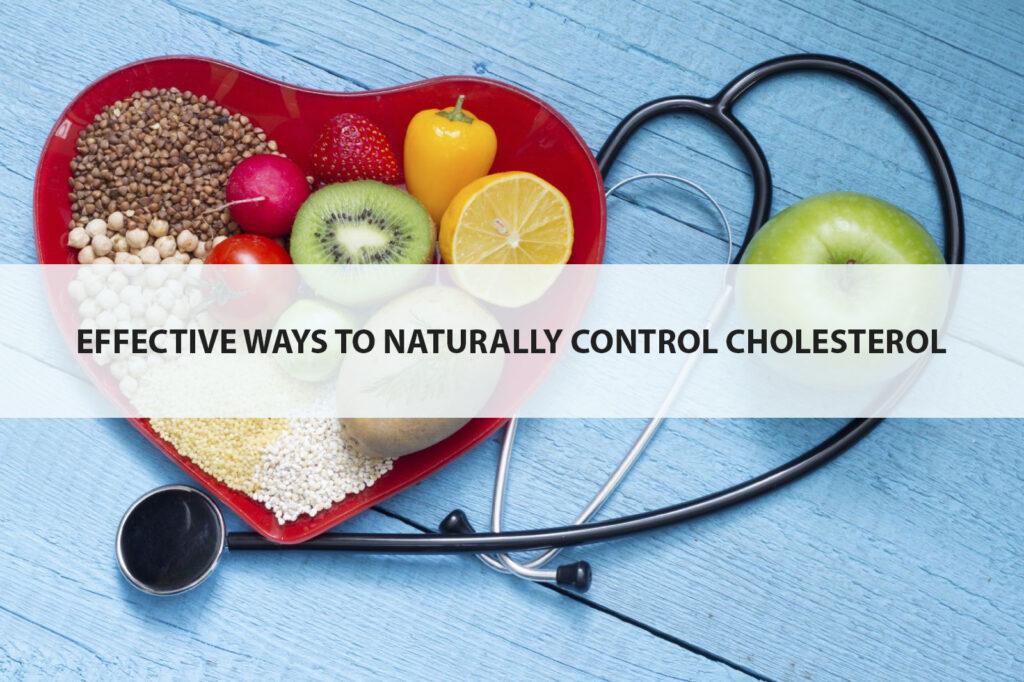High cholesterol levels can contribute to various health issues, including heart disease and stroke. Fortunately, adopting a healthy lifestyle can help you manage and control your cholesterol levels naturally. Here are some effective strategies to keep your cholesterol in check:

1. Balanced Diet: Start by focusing on a heart-healthy diet. Include plenty of fruits, vegetables, whole grains, and legumes in your meals. Opt for lean proteins such as fish, skinless poultry, and plant-based alternatives. Reduce saturated and trans fats by limiting the intake of red meat, full-fat dairy products, and processed foods.
2. Omega-3 Fatty Acids: Incorporate omega-3 fatty acids into your diet, as they can help lower cholesterol levels. Sources of omega-3s include fatty fish like salmon and trout, flaxseeds, chia seeds, and walnuts. Consider including these foods regularly to promote heart health.
3. Soluble Fiber: Foods rich in soluble fiber can help lower LDL (low-density lipoprotein) cholesterol, often referred to as “bad” cholesterol. Oats, barley, beans, lentils, fruits, and vegetables are excellent sources of soluble fiber. Aim to include these in your daily diet to support healthy cholesterol levels.
4. Regular Exercise: Engage in regular physical activity to raise HDL (high-density lipoprotein) cholesterol, often known as “good” cholesterol, and lower LDL cholesterol. Aim for at least 150 minutes of moderate-intensity exercise per week. Activities such as brisk walking, cycling, and swimming can be beneficial for your heart health.
5. Maintain a Healthy Weight: Being overweight or obese can contribute to high cholesterol levels. Adopting a healthy eating plan and incorporating regular exercise can help you achieve and maintain a healthy weight, thereby supporting optimal cholesterol levels.
6. Limit Processed Sugar and Salt: Excessive consumption of processed sugars and high-sodium foods can contribute to weight gain and negatively impact cholesterol levels. Be mindful of your sugar and salt intake by choosing whole, unprocessed foods and cooking at home whenever possible.
7. Quit Smoking: Smoking can lower HDL cholesterol and damage blood vessels, increasing the risk of heart disease. Quitting smoking is a crucial step in improving overall cardiovascular health and managing cholesterol levels.
In conclusion, adopting a holistic approach to lifestyle changes can significantly contribute to the effective management of cholesterol levels. By making healthier food choices, staying physically active, and incorporating heart-friendly habits, you can promote overall cardiovascular health and reduce the risk of heart-related complications associated with high cholesterol. Always consult with a healthcare professional before making significant changes to your diet or exercise routine.
Dr Tarun k Praharaj
Senior consultant cardiologist.
BM Birla Heart Research Centre,
1/1 National Library avenue.
Kolkata 700027
Clinic address:
Dr Praharaj’s Heart Clinic,
34 N Block B New Alipore,
Kolkata 700053
Help line:
9836111248, 9830037082
Reference: American Heart Association
